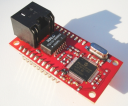Differences
This shows you the differences between two versions of the page.
| Both sides previous revision Previous revision | Next revision Both sides next revision | ||
|
en:netzer:servo [2011/12/20 09:02] svesch Fixed typo. |
en:netzer:servo [2014/01/04 18:30] svesch |
||
|---|---|---|---|
| Line 1: | Line 1: | ||
| - | ====== Connection of a scale model servo ====== | ||
| - | |||
| - | {{ :servo.png?nolink& |Servo at Netzer playground}} | ||
| - | |||
| - | The pulse outputs IO3 and SPI_INT can be directly connected to conventional [[wp>Servo_%28radio_control%29|scale model servos]]. | ||
| - | |||
| - | The pulse input of the servos is directly connected to IO3 or SPI_INT. Of course, mass is connected to mass. The voltage supply should be about 5\ V. | ||
| - | |||
| - | Such a servo motor requires a periodic signal at the pulse input with the periodic time 20\ ms. At the beginning of a period the servo awaits a positive pulse. The pulse length defines the position of the servo arm. For the three positions **left**, **center** and **right**, the values 1\ ms, 1,5\ ms and 2\ ms have proved of value, some models may deviate. | ||
| - | |||
| - | At the Netzer, the settings should be carried out as shown in the figure (IO configuration page). | ||
| - | |||
| - | {{ servoconfig.gif?nolink& |Servo configuration}} | ||
| - | |||
| - | The periodic time results from the internal 16-bit counter for continuous pulse signals: 65536\ *\ 400\ ns\ =\ 26,21\ ms. | ||
| - | |||
| - | Some servos can definitely cope with 13.1\ ms (unit\ =\ 200\ ns), you should just try it. The advantage of using the smaller unit is that the servo may be addressed in smaller steps. | ||
| - | |||
| - | In the following please find a table with some example values. Due to the deviations in the periodic times, the values probably require slight adjustments. | ||
| - | |||
| - | ^ Unit^ Leftmost = 1\ ms ^ Central position = 1,5\ ms ^ Rightmost = 2,0\ ms ^ | ||
| - | | 400 ns | 2375 (0x947) | 3750 (0xea6) | 5125 (0x1405) | | ||
| - | | 200 ns | 4750 (0x128e) | 7500 (0x1d4c) | 10250 (0x280a) | | ||
| - | |||



